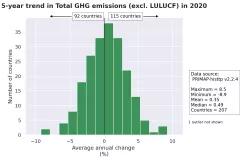The independent Global Stocktake (iGST) seeks to increase the accuracy, transparency, accountability, and relevance of the official Global Stocktake benchmarking process by bringing together independent researchers and advocates. In this paper, build on previous work, we aim to identify knowledge gaps as well as potential areas of focus for a successful GST to take place.
Executive summary:
The Paris Agreement includes a cycle of ambition. Each five years, starting in 2023, a Global Stocktake (GST) analyses the global situation and provides information for countries to prepare updated Nationally Determined Contributions (NDCs). The Paris Agreement itself is very vague on what the GST should cover. It only notes that it should “take stock of the implementation of this Agreement to assess the collective progress towards achieving the purpose of this Agreement and its long-term goals. It shall do so in a comprehensive and facilitative manner, considering mitigation, adaptation and the means of implementation and support, and in the light of equity and the best available science.”
Given the crucial role of the GST in benchmarking and enhancing global climate action, the independent Global Stocktake (iGST) seeks to increase the accuracy, transparency, accountability, and relevance of the official benchmarking process by bringing together independent researchers and advocates. In this paper, we aim to build on previous work to identify knowledge gaps as well as potential areas of focus for a successful GST to take place.
The international climate negotiations that followed the adoption of the Paris Agreement led to asking the Subsidiary Body for Scientific and Technological Advice (SBSTA) to develop guiding questions for all components of the GST, including specific thematic and cross-cutting questions. This paper responds to that request.
We describe a systematic review of the status of knowledge on questions that are relevant for the success of the global stocktake under the Paris Agreement, drawing on the thematic scope for the GST that is provided in the Paris Agreement and the associated decision of Katowice in 2018.
We find that some questions are adequately covered by (existing) knowledge and synthesized results, for example current trends in emissions, implied temperature increase by 2100 and activities implemented by countries on mitigation, adaptation and finance.
But a majority of questions are left unanswered, creating uncertainties with regards to the successful undertaking of the global stocktake. Ill-defined points include, in particular:
- Mitigation: A common vision of a 1.5°C compatible world and recommendations on “how to get there” that are specific enough to be implemented by national governments.
- Adaptation: The definition of an “adequate adaptation response” and steps towards it.
- Finance: A common understanding of what constitutes Paris-consistent financial flows and steps towards it.
- Equity: What would be an equitable implementation of mitigation, adaptation and finance as a whole?
On the basis of this overview, we would recommend that an independent global stocktake would concentrate on the following points:
- Synthesising: A main focus of the iGST could be to synthesise already existing information, where it is available (as opposed to attempting to generate new information). It would support the goals of the global stocktake, if the open questions are clearly articulated and the status of the knowledge on the answers is clear. This could include the sharing of good practices and success stories.
- Fostering common understanding: Another focus of the iGST could be to support the building of a common understanding on several issues, where such understanding is missing but would be fundamental for the success of the global stocktake and the ambition mechanism as a whole. Examples include:
- What does it mean for mitigation, adaptation and finance to be conducted in an equitable manner?
- What would be a vision for a 1.5°C compatible world at country and sector level?
- How could an “adequate” adaptation response be defined? What would be an according “adequate” consideration of loss and damage?
- How could Paris-consistent financial flows be defined?
- Forward looking: the iGST could focus on options to raise ambition, the ultimate aim of the global stocktake (as opposed to looking at what happened in the past). Here it would be particularly important to collect and synthesise country specific recommendations on what could be done next in terms of mitigation, adaptation and finance, as such information will not be generated in the official UNFCCC process.







